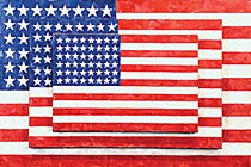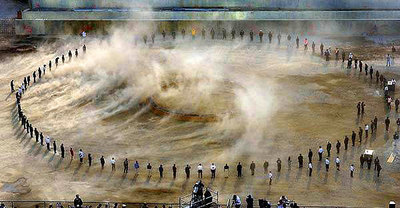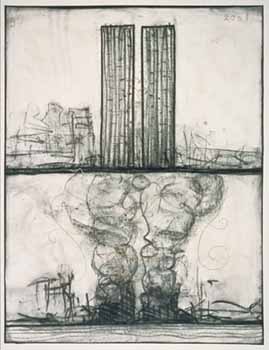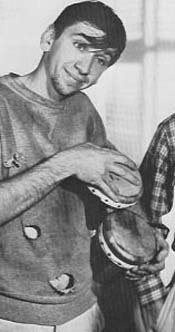

In a comment on my essay Quick. Don't Think of a Black Elephant immediately below Francis W. Porretto of Eternity Road says, "It looks as if we're doing that telepathy thing again, Gerard."
And indeed with have as he reveals in "The Shamans," written at about the same time:
The shamans of contemporary linguistic taboos have adopted nigger, faggot, cunt, and the other forbidden words as passwords, emblems of group membership -- and membership, as American Express has been at pains to remind us, has its privileges. No one outside the shamans' circle is permitted to speak the password; it's an arrogation of a jealously guarded status. He who dares must be cut down, ground into the dust, and forbidden ever to speak at all, to any effect, in any context. For as in all systems of nymic magic, the word is deemed congruent with the thing: the taboo words are at the root of the shamans' power. Failure to enforce the taboo would risk the loss of the group's privileges and immunities, laboriously amassed over the decades of exploitation of others' guilt.And that's just the conclusion. The entire essay is worth reading carefully.
One of the central values of what we call the "New Media" (Blogs, Web Pages, Podcasts, YouTube Videos and the like) is that they can give a voice to the thoughts many have but few speak and fewer still write. In the traditional media, such as the reporting vehicles of newspapers and corporate television programming, we can only have a very oblique discussion of these issues, if discussion is at all attempted. Most of the time it is confined to the pernicious ambiguity of phrases such as "the N-Word." Those things all understand, many think, but most are forbidden to speak. For the Shamanistic priests this is both and empowering and enriching situation. For the rest, they are left to tip-toe through the minefields of truth lest in speaking truth they offend and trigger the always lurking threat of violence.
It is in raising these issues, even in this small way to -- in large measure -- those who are predisposed to agree, that the alternative media proves and expands its worth.
It seems axiomatic that unless a society can speak frankly of the issues that concern it, it is doomed to remain forever in statis on the most pernicious issues that haunt it's history and threaten its tomorrows. It would seem so, but so many now have an investment in Race Hustling that it is more probable that this particular strain of crap will wash around our ankles long after we cease having to take off our shoes to get on an airplane.
Ironic that the Witchdoctors, those dark angels of our darker pasts, will probably haunt our Republic long after the last terrorist has been sent down into the dust. But that seems to be our fate unless, of course, our current Happy World comes to a sudden and unexpected conclusion.
Brainiacs of the Midwest:
Unhappy voters imperil heartland RepublicansPat Wilkerson says U.S. troops and veterans are her first priority, believes family values are important and voted Republican in 2004. But in November she'll switch parties -- though not because Democrats have won her over.
"When I vote now, it's not who I'm voting for, it's who I'm voting against," said the 59-year-old administrator, adding she is fed up with the war in Iraq and wants troops home.
Great idea. Pat. You've got the Big Picture on the State of the World Today. But your brainwave doesn't go far enough.
Let's have ALL THE TROOPS HOME. For about five years. Yes, every single solider stationed outside American homeland soil comes back now. Out of Europe. Out of Asia. Out of Korea. Out of Guantanamo. Out of South America. Out of the Balkans. Out of the MidEast.
The Air Force shall also be withdrawn from all bases everywhere. Especially Turkey and Diego Garcia so they can't operate as a watchdog over the oil fields and the world can start paying the Iranian piper whatever it decides oil is worth. And the Navy too. No more securing the sea lanes of the world. No more rolling the carriers up to help out in the next Third World Disaster. You get a tsunami that your corrupt plutocrats didn't budget for or prepare for? You are on your own. Crank up your backhoes and start digging mass graves in the muck.
Yes, for five years what we do in the world and for the world is exactly..... NOTHING. Instead, we work with the Pat Wilkerson's of the country and just parade and admire our armed forces here at home. Think of the fuel oil and aviation gas we'll save. As for the rest of the world, well, they can just pound sand. Which is what they will be doing in exactly 30 days after all the American forces in the world just pack up and head home for a long period of R&R.
[First published January 9, 2005 ]
Here is the man with three staves, and here the Wheel
And here is the one-eyed merchant, and this card,
Which is blank, is something he carries on his back,
Which I am forbidden to see. I do not find
The Hanged Man. Fear death by water.
--Eliot, The Wasteland
When a monumental disaster sweeps over humanity I expect myself to respond with an emotion that, to me at least, feels commensurate with the event. I'm certain most other people expect the same of themselves, and almost everyone is capable of it. And if, for some reason, we are not capable of it, we nevertheless know enough to pretend. It is what we expect of each other in the modern, civlized world.
We like to think we feel compassion naturally, but in truth we are raised up and trained in it. And, as a reasonably well-raised man, my expectation of myself was to feel, without question, an upwelling of empathy as I had in the past. This time it was different. This time I could feel nothing at all.
This time my ability to find compassion wasn't so much diminished as it was drowned under the awareness of a catastrophe so immense that it ground human imagination down to a dull nub. For days I was bothered by the fact that, for once, I just couldn't get my head around what had happened. For some time, I put it down to a persistent illness that seemed to hang on and on. But as my illness burned itself out I came to understand that nobody else could do it either.
Yes, I made all the expected statements of pity and shock and concern. I gave money in response to the unremitting pleas for money. I nodded and agreed that this was very, very bad. I applauded the heroes and condemned the criminals and hustlers.
I watched, straight on at first but then more and more at slant, the images sweeping out from the epicenter of the catastrophe. I listened, attentively at first and then with only a part of my mind, to the news repeat and repeat itself in an upward spiral as the numbers of the dead began as monumental and rose up into the incomprehensible.
Continued...A FOOD FIGHT OF SORTS has broken out within my family concerning the feeding habits of a distant relative. Some say his "habits" are merely those of a growing boy who forgot to stop growing upon reaching his majority. Others are shocked, SHOCKED!, with every passing meal and are suggesting an intervention.
Myself, I am unsure about the truth of the matter, but I put it to my readers to decide now that a family member has come up with "The Five Signs of Highly Hungry People."
1) The ability to move the cattle futures market on the CBOE "up limit" with one meal.My question is not whether an intervention should be held, but whether it should be held at The Sumo-Samoan Buffet or The Cheesecake Factory?2) The ability to suck potted plants and small pieces of furniture into the vortex when feeding.
3) Decapitation of medium sized mammals on the front lawn with hand tools when "hungry".
4) Eating the undercooked flesh of a hapless member of the animal kingdom at a pig roast due to inability to wait until it was done, much to the horror of the other participants.
5) And finally, using the screen name "Cheesecake Man."

The wind at Ground Zero during the first memorial service, September 11, 2002
Who has seen the wind?
Neither you nor I.
But when the trees bow down their heads,
The wind is passing by.
-- Christina Rossetti
10,000 FEARED DEAD
-- Headline, New York Post, September 12, 2001
AT THE TURN OF THE CENTURY I lived in Brooklyn Heights in, of course, Brooklyn. The opening of the Brooklyn Bridge on May 24 of 1883 transformed the high bluff just to the south of the bridge into what was America's first suburb. It became possible for affluent businessmen from the tip of Manhattan which lay just over the East River to commute across the bridge easily and build their stately mansions and townhouses high above the slapdash docks below. Growth and change would wash around the Heights in the 117 years that followed, but secure on their bluff, on their high ground, they would remain a repository of some of the finest examples of 19th and early 20th century homes found in New York City.
When I moved to Brooklyn Heights from the suburbs of Westport, Connecticut in the late 90s, it was a revelation to me that such a neighborhood still existed. Small side streets and cul-de-sacs were shaded over by large oaks and maple that made it cool even in the summer doldrums. Street names such as Cranberry, Orange and Pineapple let you know you were off the grid of numbered streets and avenues. Families were everywhere and the streets of the evenings and on the weekends were full of the one thing you rarely see in Manhattan, children.
Continued...Their silence keeps me sleepless for I know:
Within the smoke their ash revolves as snow,
To settle on our skin as fading stars
Dissolve into bright dust at break of day.
At dawn a distant shudder in the earth
Disclosed the flight of fire into steel,
The shaking not of subways underground,
But screams from out of flowers forged with flame.
We stood upon the Heights like men of straw
Transfixed by flames that started in the sky,
And watched them plunging down in death’s ballet
To land among those dying deep below.
By noon the band of smoke leaned low
Upon the harbor’s skin like some dark shawl;
A pall of smoke that in its curdled crawl
Kept reaching to extend its fatal fall.
The harp strung bridge held up ten thousand souls
Who’d screaming run beneath the paws of death,
Like dusted ghosts that lived but were not sure
They lived in light or only in reprieve.
They’d writhed and spun within that storm of smoke
And stumbled out to light and clearer air,
To find upon the river’s further shore
No sanctuary other than clear air.
The sirens scraped the sky and jets carved arcs
Within a heaven empty of all hope,
And marked its epicenter with one streak
Of black on polished bone where silver stood.
By evening all their ash had settled so
That on the leaves outside my window glowed
Their souls in small bright stars until the rain
Cleaned all that could not be clean again.
We breathed the smoke that bent and crept and crawled.
We learned to hate the smoke that lingered so.
We knew that blood could only answer blood,
And so we yearned to go and not to go.
That last, lost summer faded into ash.
Their faces faded as endless autumn flowed
Through chill and heat into our winter sea
Where warships prowled in search of stones.
Within the city, shrines were our resolve.
We placed them where we stood or where they lay.
Upon our walls and trees their faces loomed
To gaze at us from time beyond repeal.
In time, their smoke and ash became but shapes
Of stories told at dinner, found in books,
Or in the comments made by magazines
For whom the "larger issues" were of note.
At first their faces faded with the rains,
The little altars thick with wax were scraped,
But now beneath clear plastic they endure
To remind us all that we’ve not yet escaped.
Their silence keeps me sleepless for I know.

If peace needs to be purchased with the sword,
we should be ready to do this. We must become
what we were during the Second World War
--ruthless and unrelenting.
[What follows is a slightly edited transcript of what I saw and how I felt on the 11th of September, 2001 from Brooklyn Heights in New York City. On that day I was posting to a West Coast Computer Conferencing system known as The Well. As a result, even though I was writing from Brooklyn Heights, directly across from the Towers the time stamp reflects PST]
Tue 11 Sep 01 08:07
Saw the first tower collapse from the Promeade across the river in Brooklyn. Fine white and pale yellow ash everywhere. Lower Manhattan covered in smoke with ash still drifting down.
Military jets overhead every five minutes or so.
Lower span of Brooklyn Bridge jammed with people walking out of the city, many covered with white ash. Ghosts. The Living Dead. BQE empty except for convoys of emergency vehicles.
Sirens in all directions. Ferry ships emerging from the smoke heading to the Brooklyn shore riding low in the water fully loaded.
This is monstrous.
Deaths in the thousands in New York.
Continued...Yesterday: words that would ring true today
The dogmas of the quiet past, are inadequate to the stormy present. The occasion is piled high with difficulty, and we must rise -- with the occasion. As our case is new, so we must think anew, and act anew. We must disentrall ourselves, and then we shall save our country.From: Abraham Lincoln's Annual Message to Congress -- Concluding Remarks, 1862 First Posted to American Digest 2004-04-17Fellow-citizens, we cannot escape history. We of this Congress and this administration, will be remembered in spite of ourselves. No personal significance, or insignificance, can spare one or another of us. The fiery trial through which we pass, will light us down, in honor or dishonor, to the latest generation.
Today:Bush and Lincoln Echoes of the past in today's strategic mistakes. BY NEWT GINGRICH Thursday, September 7, 2006 12:01 a.m. EDT
"The dogmas of the quiet past are inadequate to the stormy present. . . . As our case is new, so we must think anew, and act anew. We must disenthrall ourselves." --Abraham Lincoln, Annual message to Congress, Dec. 1, 1862WASHINGTON--Five years have passed since the horrific attack on our American homeland, and, still, there is one serious, undeniable fact we have yet to confront: We are, today, not where we wanted to be and nowhere near where we need to be....First, the president should address a Joint Session of Congress to explain to the country the urgency of the threat of losing millions of people in one or more cities if our enemies find a way to deliver weapons of mass murder to American soil. He should further communicate the scale of the anti-American coalition, the clarity of their desire to destroy America, and the requirement that we defeat them. He should then make clear to the world that a determined American people whose very civilization is at stake will undertake the measures needed to prevail over our enemies. While desiring the widest possible support, we will not compromise our self-defense in order to please our critics.

GILLIGAN TO MILLIONS, he'll always be Maynard G. Krebs to me: Bob Denver, TV's Gilligan, dead at 70.
In general, I don't find myself identifying with television characters. They are, after all, characters on television. But I do recall that, as a teenager stuck in the trackless suburbs of Sacramento waiting to get out of high school and into the University so my life could begin, Maynard G. Krebs was my first and last television-induced role model. I idolized this character. I had the grey sweatship with the sleeves torn off and a couple of holes I put in it myself. I had the bongos (Hey, nobody's perfect.), and I had the attitude.
Continued...
- November 2017
- October 2017
- June 2017
- May 2017
- April 2017
- March 2017
- February 2017
- January 2017
- December 2016
- November 2016
- October 2016
- September 2016
- August 2016
- July 2016
- June 2016
- May 2016
- April 2016
- March 2016
- February 2016
- January 2016
- December 2015
- November 2015
- October 2015
- September 2015
- August 2015
- July 2015
- June 2015
- May 2015
- April 2015
- March 2015
- February 2015
- January 2015
- December 2014
- November 2014
- October 2014
- September 2014
- August 2014
- July 2014
- June 2014
- May 2014
- April 2014
- March 2014
- February 2014
- January 2014
- December 2013
- November 2013
- October 2013
- September 2013
- August 2013
- July 2013
- June 2013
- May 2013
- April 2013
- March 2013
- February 2013
- January 2013
- December 2012
- November 2012
- October 2012
- September 2012
- August 2012
- July 2012
- June 2012
- May 2012
- April 2012
- March 2012
- February 2012
- January 2012
- December 2011
- November 2011
- October 2011
- September 2011
- August 2011
- July 2011
- June 2011
- May 2011
- April 2011
- March 2011
- February 2011
- January 2011
- December 2010
- November 2010
- October 2010
- September 2010
- August 2010
- July 2010
- June 2010
- May 2010
- April 2010
- March 2010
- February 2010
- January 2010
- December 2009
- November 2009
- October 2009
- September 2009
- August 2009
- July 2009
- June 2009
- May 2009
- April 2009
- March 2009
- February 2009
- January 2009
- December 2008
- November 2008
- October 2008
- September 2008
- August 2008
- July 2008
- June 2008
- May 2008
- April 2008
- March 2008
- February 2008
- January 2008
- December 2007
- November 2007
- October 2007
- September 2007
- August 2007
- July 2007
- June 2007
- May 2007
- April 2007
- March 2007
- February 2007
- January 2007
- December 2006
- October 2006
- September 2006
- August 2006
- July 2006
- June 2006
- May 2006
- April 2006
- March 2006
- February 2006
- January 2006
- December 2005
- November 2005
- October 2005
- September 2005
- August 2005
- July 2005
- June 2005
- May 2005
- April 2005
- March 2005
- February 2005
- January 2005
- December 2004
- November 2004
- October 2004
- September 2004
- August 2004
- July 2004
- June 2004
- May 2004
- April 2004
- March 2004
- February 2004
- January 2004
- December 2003
- November 2003
- October 2003
- September 2003
- August 2003
- July 2003
- June 2003
- As I Was Saying....
- Notes in Passing
- The Deluge
- Piglet or Proud American?
- The Wind In The Heights
- The Missing
- Notes Made on 11 September 2001
- "We Must Disenthrall Ourselves"
- "WORK!?!?"
- Why Everybody in Florida Locks Their Doors at Night
